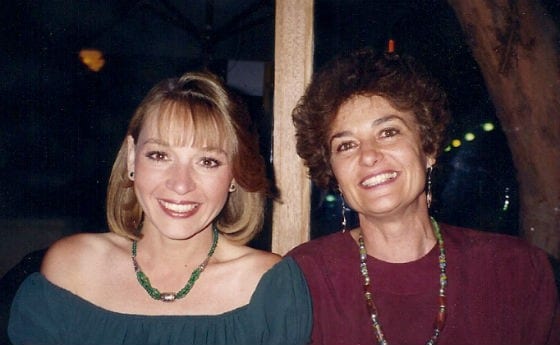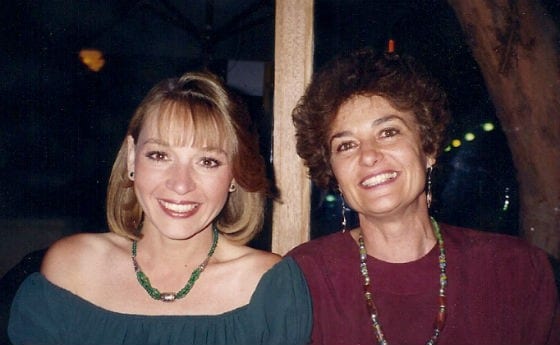Professor Nadia Badawi credits her mentor, Professor Fiona Stanley as the inspiration behind her professional development and success.
Although the two professors are now located on opposite sides of the country, their bond is still a very close one.
Epidemiologist Prof Stanley founded the Telethon Institute for Child Health Research in Perth 21 years ago, recently stepping down as director after two decades and becoming patron. In 2003 she was named Australian of the Year for her dedication to researching the causes of major childhood illnesses and birth defects.
Prof Badawi is the Department Head of the Grace Centre for Newborn Care at The Children’s Hospital at Westmead. She is also the Macquarie Group Foundation Professor of Cerebral Palsy at the Cerebral Palsy Research Institute. She arrived in Australia from Dublin in 1992 to work at Prof Stanley’s Institute.
They share their story with Women’s Agenda.
Professor Fiona Stanley AC
I was very lucky – I interviewed Nadia and here I had this fantastic neonatal paediatrician who wanted a research project.
At the Institute we had been doing research into the cerebral palsies. Cerebral palsy is the most common motor disorder in childhood so about 2.5 per thousand births in Australia will eventually have a cerebral palsy diagnosis by the age of four of five. It’s a very challenging area to research particularly if you are trying to find out the cause.
I suggested the project to Nadia – a case-controlled study for her PhD – and I was her supervisor. The project is still the biggest and the best project in Newborn Encephalopathy (NE) in the world.
Everyone thought that NE occurred at birth and of course we knew that a high proportion of these kids would go on to get cerebral palsy. Nadia’s project put to bed the myth that the majority of kids with both NE and then cerebral palsy have birth asphyxia. We showed very clearly that most of the kids who had NE and most of the kids who had cerebral palsy have their brain damage well before the birth. It was such an important breakthrough. So if you wanted to really research the causes of brain damage you actually have to look in the pregnancy or even before the mother conceives – problems that the mother might have.
One of the most important things you do as a mentor is to give your student, and once she becomes a post-doc, the best research support you can. Nadia was a doctor and she had done paediatrics and then neonatology – it wasn’t as if she was a young student without any experience. But she had to learn how to collect data, how to analyse it. Because I was director of the Institute as well, I had an environment for her that was very nurturing. What I wanted to do was not only give her all my wisdom, advice and support but we had people who could help her with the statistical analysis, other people she could call upon.
We’d send Nadia off to conferences, encourage her to present her data and to publish in the top journals – to really set her career up in research.
I don’t need any more accolades. I don’t need to be the first author on a paper, or to get more awards. So I can just give Nadia, or whoever I’m mentoring, the benefits of my experience, my knowledge, my friends and colleagues. The more successful you are as a researcher or as a person, the more successful you are as a mentor because in fact it doesn’t matter to you anymore. It’s important that your mentee does well and that’s the satisfaction – it’s a hugely rewarding role.
Another important part of mentoring, particularly of women – is discussing how to balance a career and kids. Nadia was having her children while this was all happening and I had had children and worked through my mothering and found it really hard. I have two daughters and now three grandchildren. Whatever happens you feel guilty. You feel guilty if you are at home, you feel guilty if you’re at work so we would discuss those things and share stories.
Nadia has had a stellar career. And I think to myself, if she hadn’t come to us and we hadn’t given her this project, she probably would have done well but we gave her an opportunity. She made the most of the opportunity and she got the first chair of Cerebral Palsy in Australia. She came across and spoke at my retirement day in April this year and I just felt terrific that there she was competent, speaking with such assurance, answering the questions beautifully. I was very proud.
The three things I admire about Nadia the most is she has this fantastic qualification; she has this marvellous passion that she really, really believes she can do something that is going to make a difference to children with cerebral palsy and their families; and the third thing is her compassion. I think that we don’t have enough empathy in the world.
At least every year we try to catch up and then we are in contact by email or phone. She knows that I will be there for her. A lot of the people that I mentor I become really close to. I think all of us need mentors. I’m now 66 and I’m still using my mentors for advice and as a sounding board.

Prof Nadia Badawi
I had heard about Fiona Stanley – she was gaining international reputation, herself and Prof Eve Blair, for their amazing work in cerebral palsy.
I rang Fiona in Australia from Dublin and of course she took the phone call – a complete stranger ringing her out of the blue. She said, “I’m going to be in London in a few weeks, why don’t you fly over and meet me” and I said “of course”. So I took a day off work, flew up to London and went to meet this delightful, very charismatic, gorgeous-looking, warm woman. She sat down and interviewed me and after an hour said “I think we’ll get on really well”. She said “we’ll sort out all the technicalities and paperwork later on”.
One of the great things about Fiona is she is remarkably open and liberal in her views about other people. I can’t imagine other people saying “look, someone is trained in Egypt and then Ireland and I’m going to bring them over”. She went with her instinct that this would work out.
My husband, an Australian obstetrician, was keen to go back home and had several offers of positions. But when I got the chance to do a PhD with Fiona we made a joint decision for both of us to go to Perth instead of NSW.
While I was doing my PhD with Fiona I had my first daughter. Fiona has two daughters and I have two daughters, who are now aged 12 and 17. It was really great because here I was alone, having a new baby, it was hot, early December and my husband was working fulltime. I remember it was day 17 and I was thinking “I don’t know how long I can stand this” so I put Lara in the pram and walked to the Institute. They all laughed and said “we’ve been running a tab on how long you’d be able to stay at home”. You know what was great – I brought her with me while I completed my PhD and continued to breastfeed her. Fiona and all the other women at the Institute were so supportive and a lot of the men too.
Fiona would tell all these amusing stories of her own parenting mishaps. She would bring her
first born to work with her when she was doing research and along to the Department of Health. I think Fiona told those stories to let me know she understood how difficult it was. When you see such a successful person articulating those things, it gives you strength. I think some of us can be a bit confounded by thinking someone’s a super mum and that doesn’t actually help most women.
We moved to NSW in 1997 so I could progress in my career and so John could be close to his family. It was very gut-wrenching to leave the Institute. Although it’s great working at The Children’s Hospital at Westmead, it took me a while to settle down again.
I would never have got involved with the Cerebral Palsy Alliance in NSW or ended up as chair without the work I did in Western Australia with Fiona – there’s no way. If she hadn’t given me that first chance I probably would have been doing something else.
My PhD thesis with Fiona – I’ve been amazed at the hundreds of times the study has been cited and it hasn’t been replicated. The work I did with her on cerebral palsy has been life changing. I think the best compliment you can give your mentor is to mentor others when you’re in a position to do so. It’s like ripples in a pond and enables us to have an influence far beyond what we could achieve ourselves.


